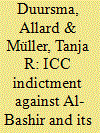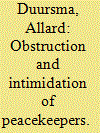| Srl | Item |
| 1 |
ID:
166684


|
|
|
|
|
| Summary/Abstract |
The impact of the International Criminal Court (ICC) on peace processes has received much scholarly attention. We argue, based on the ICC arrest warrant against Sudanese President Omar al-Bashir, that ICC indictments against government officials not only can be detrimental to the prospects for peace, but can also negatively affect everyday practices of peacekeepers and humanitarian workers. We draw on a combination of quantitative and qualitative data in order to develop our argument. We interrogate some measurable consequences of the indictment in relation to the work of the United Nations – African Union Mission in Darfur (UNAMID) as well as humanitarian actors in Darfur. We do so using a data set compiled to support the work of UNAMID. We also draw on interviews with UN and UNAMID staff, aid workers, and representatives of the conflict parties. Our analysis shows that the indictment of President al-Bashir was perceived by the Sudanese government as the continuation of a confrontational approach pursued by the international community. We further show that the indictment accelerated patterns of obstruction and intimidation of peacekeeping actors, other third-party actors, and local staff associated with these. This complicated the everyday activities of peacekeepers and humanitarian efforts.
|
|
|
|
|
|
|
|
|
|
|
|
|
|
|
|
| 2 |
ID:
165451


|
|
|
|
|
| Summary/Abstract |
While recent research focuses on why conflict parties attack peacekeepers, little attention has been given to other types of resistance against peacekeeping missions, such as intimidation and obstruction. It is argued in this article that one reason why peacekeepers are obstructed and intimidated is that armed actors that target civilians want to maintain the operational space to carry out attacks against civilians and want to prevent peacekeepers from monitoring human rights violations. A spatially and temporally disaggregated analysis on resistance against peacekeepers in Darfur between January 2008 and April 2009 indeed suggests that the intimidation and obstruction of peacekeepers is more likely to take place in areas with higher levels of violence against civilians. The findings hold when taking into account the non-random occurrence of violence against civilians through matching the data. Finally, anecdotal evidence from other sites of armed conflict than Darfur suggests that resistance against peacekeepers in these cases is also likely to be related to the targeting of civilians. This suggest that in order to be effective in protecting civilians, peace missions should not only be robust as highlighted in previous research, but peace missions should also develop an effective strategy to deal with armed groups that try to prevent peacekeepers from fulfilling their mandate.
|
|
|
|
|
|
|
|
|
|
|
|
|
|
|
|